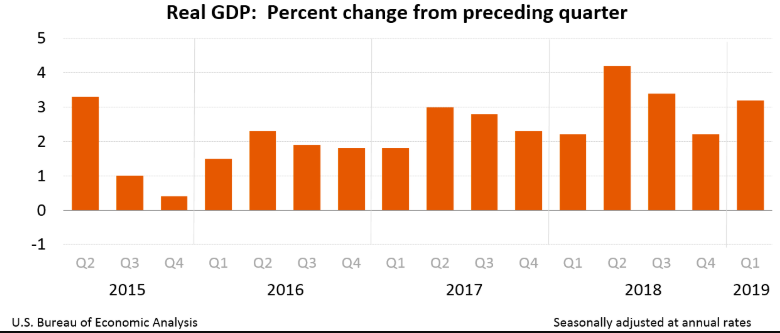Gross Domestic Product reversed its course in in the first quarter of 2019, according to the advanced estimate from the Bureau of Economic Analysis.
Real GDP increased at an annual rate of 3.2% in the first quarter, compared with a gain of 2.2% in the prior three months, according to the advanced estimate. It was the first acceleration of growth since mid-2018.
Today’s first-quarter advance estimate is based on incomplete source data that is subject to further revision and will be followed by a second estimate, due to be released in May.
The chart below shows that GDP grew nearly one percentage point from the fourth quarter but is slightly below the first quarter of 2018.
(Source: BEA)
Mortgage Bankers Association Chief Economist Mike Fratantoni said the first quarter's 3.2% pace was much faster than anticipated.
"Although this advance estimate is subject to revision, if it holds up, this faster growth should continue to provide strong support for the job and housing markets,” Fratantoni said. “Growth was driven in the first quarter by an increase in inventories and a strong reading on net exports, two factors which could be reversed in the second quarter. Household spending growth actually slowed a bit in the first quarter, which is a bit contrary to recent strong readings on retail sales. Overall, a solid start of the year for the economy.”
The increase in real GDP in the first quarter reflected positive contributions from non-residential fixed investment, personal consumption expenditures, private inventory investment and state and local government spending.
These were partly offset by negative contributions from residential fixed investment. Notably, imports decreased in percentage.
Current-dollar GDP increased 3.8%, or $197.6 billion, in the first quarter to a level of $21.06 trillion. This is down from the fourth quarter’s 4.1%, or $206.9 billion.
The gross domestic price purchase index increased 0.8% in the first quarter, down from an increase of 1.7% in the fourth quarter. However, personal consumption expenditures increased 0.6%, down from 1.5% last quarter.






